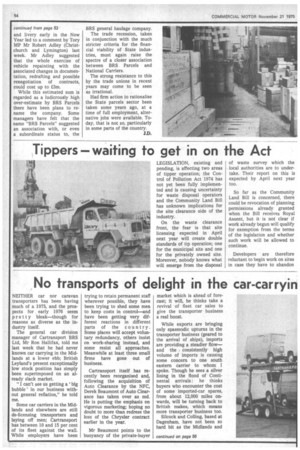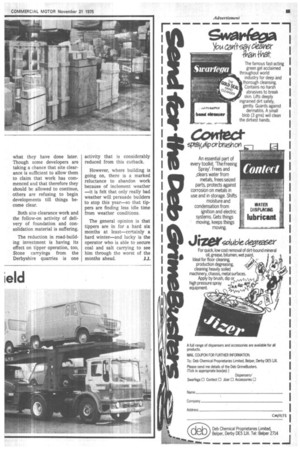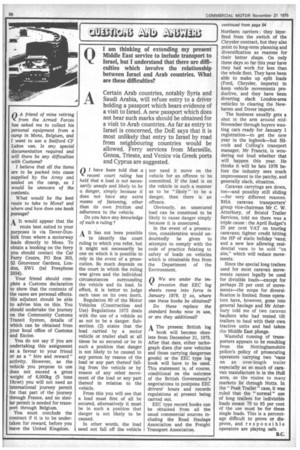No transports of delight in the car-carryin ield
Page 60

Page 61

Page 62

If you've noticed an error in this article please click here to report it so we can fix it.
NEITHER car nor caravan transporters has been having much of a 1975, and the prospects for early 1976 seem pre tt y bleak—though for reasons as diverse as the industry itself.
The general car division manager of Cartransport BRS Ltd, Mr Ron Hallif ax, told me last week that he had never known car carrying in the Midlands at a lower ebb; British Leyland's present exceptionally low stock position has simply been superimposed on an already slack market.
"I can't see us getting a 'big bubble' in our business without general reflation," he told me.
Some car carriers in the Midlands and elsewhere are still de-licensing transporters and laying off men; Cartransport has between 10 and 15 per cent of its fleet against the wall. While employers have been trying to retain permanent staff wherever possible, they have been trying to shed some men to keep costs in control—and have been getting very different reactions in different parts of the country. Some places will accept voluntary redundancy, others insist on work-sharing instead, and some resist all approaches. Meanwhile at least three small firms have gone out of business.
Cartransport itself has recently been reorganised and, following the acquisition of Auto Clearance by the NFC, Derek Beaumont of Auto Clearance has taken over as md. He is putting the emphasis on vigorous marketing; hoping no doubt to more than redress the loss of the Chrysler contract earlier in the year.
Mr Beaumont points to the buoyancy of the private-buyer market which is ahead of forecast; it will, he thinks take a revival of fleet car sales to give the transporter business a real boost.
While exports are bringing only spasmodic upturns in the transporter business (geared to the arrival of ships), imports are providing a steadier flow— and the consistently high volume of imports is causing some concern to one south eastern carrier to whom I spoke. Though he sees a silver lining in the flood of Continental arrivals : he thinks buyers who encounter the cost of some imported-car spares, from about 12,000 miles onwards, will be turning back to British makes, which means more transporter business too.
Silcock and Coiling, based at Dagenham, have not been so hard hit as the Midlands and Northern carriers : they benefited from the switch of the Chrysler contract, but they also point to long-term planning and diversification as reasons for their better shape. On only three days so far this year have they had work for less than the whole fleet. They have been able to make up split loads (Ford, Chrysler, imports) to keep vehicle movements productive, and they have been diverting slack London-area vehicles to clearing the Newhaven and Dover imports.
The business usually gets a shot in the arm around midNovember through buyers wanting cars ready for January 1 registration—to get the new year in the logbook—but Silcock and Colling's transport manager, Mr Francis, is wondering out loud whether that will happen this year. He thinks it will be late 1976 before the industry sees much improvement in the patchy, and generally slack, situation.
Caravan carryings are down, too—and possibly still sliding —for very different reasons. RHA caravan transporters' group vice-chairman Mr C. W. Atterbury, of Bristol Trailer Services, told me there was a triple cause : the April Budget's 25 per cent VAT on touring caravans; tighter credit hitting the HP of static holiday 'vans; and a new law allowing residential vans to be sold "on site," which will reduce movements.
Since the special long trailers used for most caravan movements cannot legally be used for divisible loads—except for perhaps 25 per cent of movements—the scope for diversification is limited. Some operators have, however, gone into general haulage and Mr Atterbury told me of two caravan hauliers who had rented tilt trailers to haul with their own tractive units and had taken the Middle East plunge.
Wasteful running of transporters appears to be resulting from the Nottinghamshire police's policy of prosecuting operators carrying two 'vans on an over-length trailer especially as so much of caravan manufacture is in the Hull area, so the routes to many markets lie' through Notts. In the "Peak Trailer" case, it was ruled that the " normal " use of long trailers for indivisible loads meant 75 to 85 per cent of the use must be for these single loads. This is a percentage difficult to prove or disprove, and responsible operators are playing safe.
B.C.








































































































